I Think, Therefore, I Still Am by Rai Peterson
This week I am “imprisoned” at the Kurt Vonnegut Museum and Library to commemorate Banned Books Week; it’s a daunting prospect that I anticipate with equal parts eagerness and anxiety. 
I wonder about the provocative actress Tilda Swinton who allowed herself to be exhibited in New York’s Museum of Modern Art while sleeping in a glass box.
I worry about Ezra Pound, who spent 3 weeks on display in 1945 as a prisoner of the U. S. Military near Pisa, Italy (for identifying as a Fascist on Italian radio) ; he was kept in a 6 by 6 ft. steel cage, a contraption built to expose death row inmates to the public, and the trauma of that is thought to have exacerbated his mental illness.
I don’t think trauma will be my problem. I will be living with a camp cot and a lot of books, surrounded by the congenial folks at the KVML, albeit in the glass window that faces Senate Street in downtown Indianapolis.
Let’s not kid ourselves. I’m volunteering to be a mock prisoner. I have neither guards nor fellow inmates to fear or befriend. Instead of bread and water, my meals are being catered by local restaurants. I will have unlimited visitor time, access to Internet and telephone at will.
 Although I may not leave my window “cell,” I will have plenty of time to read, think, and write, and none of that will be usurped by writing an appeal of my sentence or scouring law books for a loophole. If actuarial tables are accurate, I should have very little chance of dying in prison. And I’m also not sullying the family name.
Although I may not leave my window “cell,” I will have plenty of time to read, think, and write, and none of that will be usurped by writing an appeal of my sentence or scouring law books for a loophole. If actuarial tables are accurate, I should have very little chance of dying in prison. And I’m also not sullying the family name.
Truthfully, it is an academic’s dream to be left alone with a computer for a solid week while my colleagues cover my classes and meetings. (Thanks Jim, Jim, and Kim for that!)
My friends in graduate school and I used to joke about committing a white collar crime so that we could be sent to a minimum security prison to write our dissertations—no need to side hustle at adjunct teaching jobs to cover rent and meals, we thought. We’d let Uncle Sam feed, clothe, and house us until we landed tenure track jobs with the stellar resumes we’d accrue. The problem was that we had so little political power, we didn’t have access to white collar criminal opportunities.
Kurt Vonnegut must have made the same joke to himself sometimes, writing stories and novels in a ramshackle house by a salt marsh on Cape Cod. His space was often over-run by six children, dogs, neighbors, admirers.
In his novel Jailbird, Vonnegut reverses much of what he has taught readers about his running joke of a recurring character, Kilgore Trout, the science fiction writer who seems to have been Vonnegut himself in a parallel universe, one in which he did not successfully escape genre-labeling as a drug-store paperback, science fiction writer—the treatment he received when his first novels, Player Piano and Sirens of Titans, were under-estimated by critics.
In Jailbird, Vonnegut tells us that Kilgore Trout is the pseudonym of one Dr. Richard Fender, a veterinarian convicted of treason during the Korean War. Fender is a privileged inmate; he runs the supply room, he is well-connected inside and out of the joint. For instance, he has no problem obtaining Edith Piaf records.
So, I see myself as a Richard Fender character, one who, although physically imprisoned, maintains his reach. I’ll usurp Vonnegut’s voice occasionally in this blog; after all, living among many of things will probably enhance my imagination and encourage my oddly positive cynicism.

In subsequent posts, I’ll write about what I’m reading and doing during my week of mock incarceration, about why we speak out against censorship in a country where that problem barely exists, and, invariably, I’ll discover a few thoughts about the theme of this year’s Banned Books Week: Lonesome No More, the subtitle of Vonnegut’s book Slapstick.
So please come back to these pages. Or stop by the KVML to chat. You’ll find me. I’ll be wearing an orange jumpsuit and a look of contented bewilderment.



